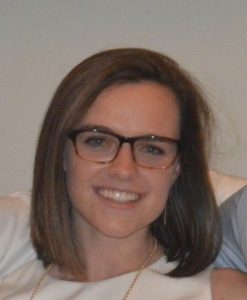A Recipe for Success, a speech given in a series hosted by the HHIVE Research Lab, took place in the Health Sciences Library on January 24. The talk was given by Jessica Barnhill, a Postdoctoral Research Fellow in the Program on Integrative Medicine at UNC-CH and a clinician who has identified problems in the health community. She began with a powerful anecdote about a man who arrived in her clinic complaining “there is something wrong with my socks.” After discovering that his right foot was swollen and rotten, Jessica referred him to the hospital and assumed his care to be complete. A few months later, the man returned to the clinic, again complaining “there is something wrong with my socks.” Confused, Jessica removed the sock of his right foot. Finding nothing, she proceeded to examine the left and found it as swollen and rotten as the other had been months prior. The man had been in the hospital for over a month, had his right foot treated, yet his left foot remained undiagnosed. While sifting through the guilt of not having discovered this problem the first round, Jessica was enlightened on one of the major faults of the U.S. healthcare system. She realized that the multidisciplinary care system she had assumed to be in place had actually been what had failed the patient due to the emphasis placed on quantity over quality.
To investigate where these gaps in the healthcare system originate, the Center for Complex Health and Social Needs has done studies on the functions of the system. They discovered that 1% of the U.S. population accounts for 25% of all U.S. healthcare expenditures. The people of this population are usually affected by addictions, mental illness, chronic pain, cognitive injury, and common threads of unstable housing and trauma. To further emphasis the breadth of the issue, Jessica used the emotional story written by The New York Times of a woman who was discharged from a hospital in Baltimore who dropped off in freezing temperatures at the bus stop and abandoned. This particular instance, along with “Greyhound Therapy,” a phenomenon in which healthcare workers buy a patient a bus ticket to another state telling them to call 911 once they arrive, indicates that one of the largest deficits in the American healthcare system actually comes from outside of the hospital.
To combat this, Dr. Barnhill advocated for increased emphasis on post hospital care. She said that the solution to this problem involves “hotspotting,” a healthcare initiative that is “a data-driven process for the timely identification of extreme patterns in a defined region of the healthcare system. It is used to guide targeted intervention and follow-up to better address patient needs, improve care quality, and reduce cost.” This method creates a system that includes few paid individuals that branch out into unpaid, public volunteers who are trained to recognize “superusers” of the healthcare system. Along with this system, Dr. Barnhill also advocated for Authentic Healing Relationships, minimally destructive medicine, trauma informed care, and The Quadruple Aim.
Her main focus of the later part of the speech was The Quadruple Aim. A spin-off of the previously applied “Triple Aim,” The Quadruple aim has four integral aims: better care, more efficient care, better population outcomes, and clinician health. The fourth is the new branch of the philosophy and aims to decrease physician burnout that results in impersonal care and stagnation of health improvement. In an effort to combat this development, Dr. Barnhill professed the importance of emphasizing not just the health of the patient, but the mental and emotional health of the healthcare workers as well. In her experience, healthcare workers often blame themselves. A common thought that Dr. Barnhill has come into contact with, “I must be a bad doctor because I picked the wrong patients,” highlights this. To be completely functional, the healthcare system needs to focus on the health of all members before it can increase productivity on the patient end. For the program to be considered a success, Dr. Barnhill suggested that instead of asking “What is the matter with you?” physicians should learn to ask “What matters to you?” This approach has been shown to increase doctor/patient relationships and to encompass integrative health. An adaptation of the fourth aspect of the Quadruple Aim will protect those who have dedicated their lives to protecting others.
Overall, a shift in the philosophy of the system will allow patients and physicians to have “presence of mind in the eye of the storm.” While Dr. Barnhill stated “the system is really
fundamentally broken,” she also harbors hope for the future of the healthcare system. With many undergraduates and graduates in the rooms, she ended the speech with a call for change, a change that should come in the next generation of healthcare workers.
__________________________________________________
Kate Capitano is a first year undergraduate student majoring in Global Studies. Her concentration is Public Health and Environment with Latin America as the area of study. She is also on the pre-med track and hopes to combine the two through the Medicine, Literature, and Culture Minor. Specifically interested in women’s rights and health, Kate hopes of one day becoming an OBGYN.


